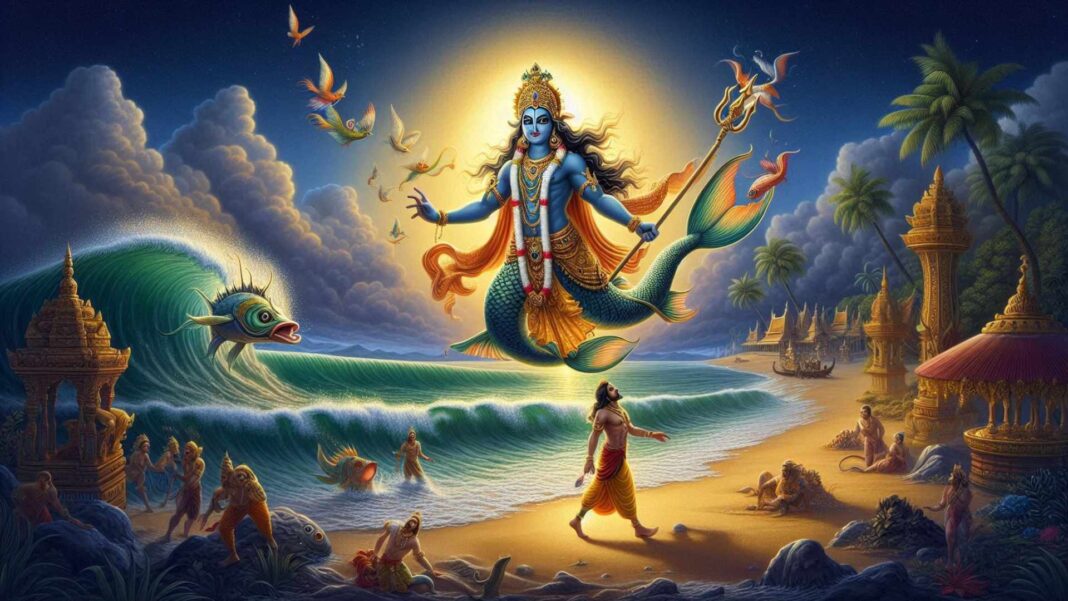Introduction
A Brief Overview of Matsya in Hinduism
Matsya, the fish avatar of Lord Vishnu, is the first of the Dashavatara (ten incarnations) in Hinduism. This divine form symbolizes preservation and rescue during a cosmic deluge. Matsya saved the sacred Vedas and guided humanity toward righteousness and knowledge, highlighting Vishnu’s role as the protector of dharma (cosmic order).
Read More About Deities And Gods
Significance in Daily Hindu Life
Matsya is celebrated as a savior deity, representing protection, renewal, and divine wisdom. Devotees look to Matsya for guidance in overcoming challenges, much like how he rescued the world from destruction in mythology. His stories inspire trust in divine intervention during adversity.
Cosmic and Spiritual Importance
Matsya signifies the eternal cycle of destruction and renewal in the universe. His form as a fish connects him to water, symbolizing life, adaptability, and transformation. Spiritually, Matsya emphasizes the importance of knowledge and the divine duty to uphold righteousness.
Names and Etymology
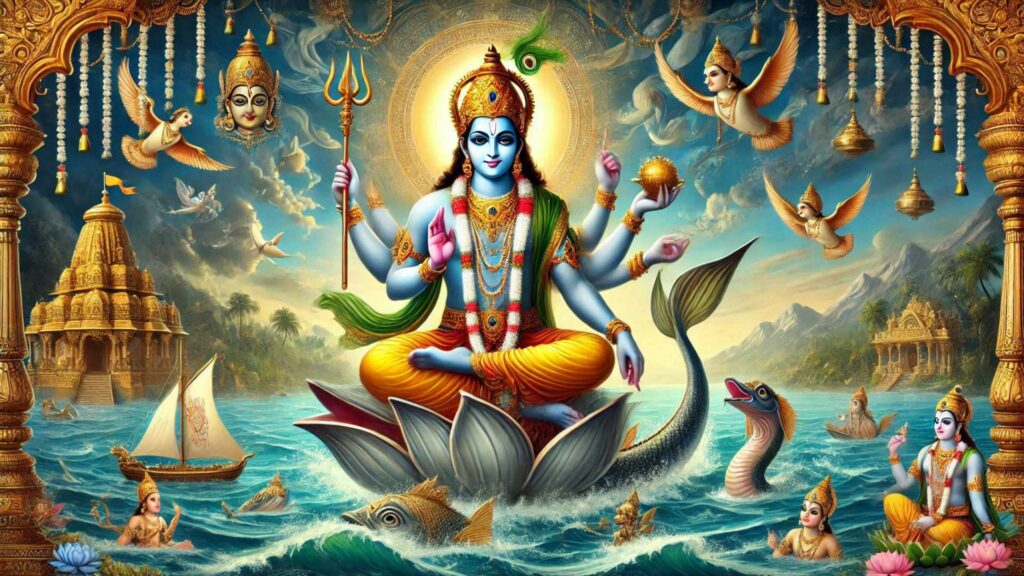
Meaning of Matsya
The word “Matsya” translates to “fish” in Sanskrit, denoting his aquatic form. It reflects his adaptability, ability to navigate turbulent waters, and his role as the savior of creation.
Other Names and Their Significance
- Matsyanatha: Lord of the fishes, emphasizing his dominion over aquatic life.
- Vedarakshaka: Protector of the Vedas, highlighting his role in preserving sacred knowledge.
- Pralayabandhu: Friend during the deluge, reflecting his guidance during cosmic dissolution.
Symbolism and Iconography
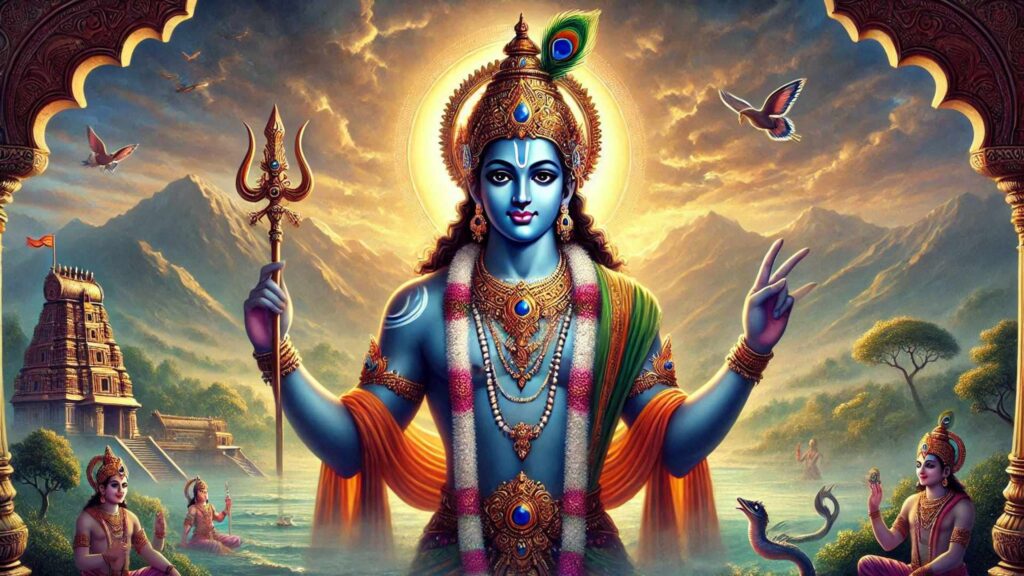
Physical Description and Meaning
Matsya is depicted as a half-man, half-fish figure:
- Upper body of Vishnu: Representing divinity and wisdom.
- Lower body of a fish: Symbolizing adaptability, protection, and the element of water.
Symbolism
- Fish Form: Represents adaptability, life, and sustenance.
- Sacred Vedas: Symbol of knowledge and divine order.
- Water: Reflects creation, purification, and transformation.
The Flower Connection
The lotus, a frequent element in Matsya’s iconography, signifies purity, spiritual awakening, and transcendence.
Colors and Symbols
- Blue or Green: Representing water and life’s sustenance.
- Conch and Chakra: Denoting Vishnu’s role as protector and enforcer of dharma.
Mythology and Stories
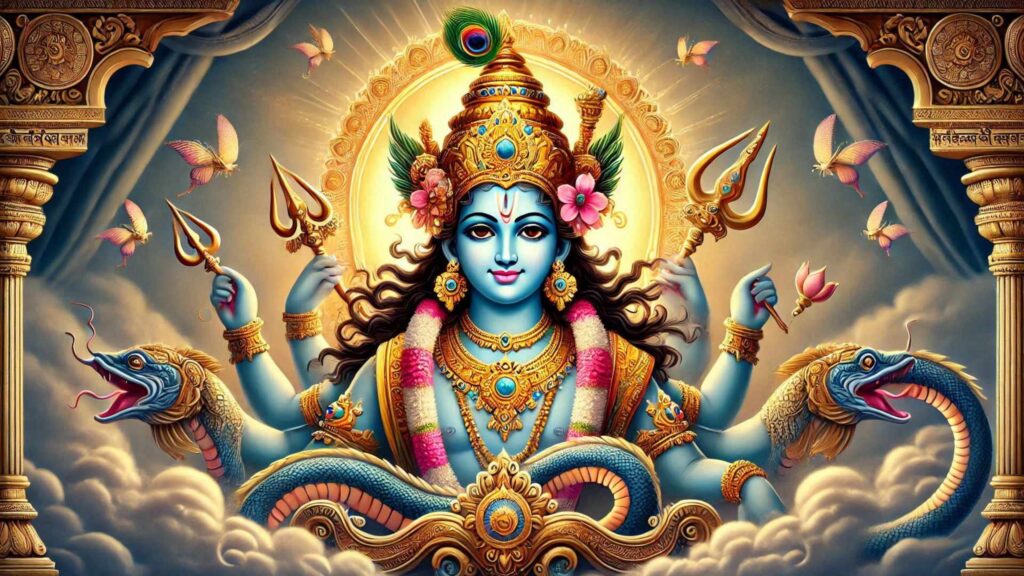
Birth Story
Matsya’s story originates in the Satya Yuga. According to the Puranas, a small fish sought shelter from King Satyavrata (later known as Manu). The fish revealed itself as Lord Vishnu and warned of a cosmic deluge. Matsya guided Manu to save all living beings and the Vedas.
Key Stories
- Rescue of the Vedas: Matsya saved the sacred texts from a demon, symbolizing the preservation of knowledge.
- Guiding Manu: Matsya helped Manu build a massive boat, securing the survival of creation.
Connection with Other Gods
Matsya’s mission is closely tied to Brahma (creator) as it involves safeguarding the Vedas, the foundation of cosmic order.
Role in Epics
Matsya’s story is mentioned in the Shatapatha Brahmana and Bhagavata Purana, where his role as a preserver is celebrated.
Famous Blessings and Boons
Devotees believe Matsya grants protection, wisdom, and clarity, helping them navigate life’s challenges and uncertainties.
Spiritual Significance
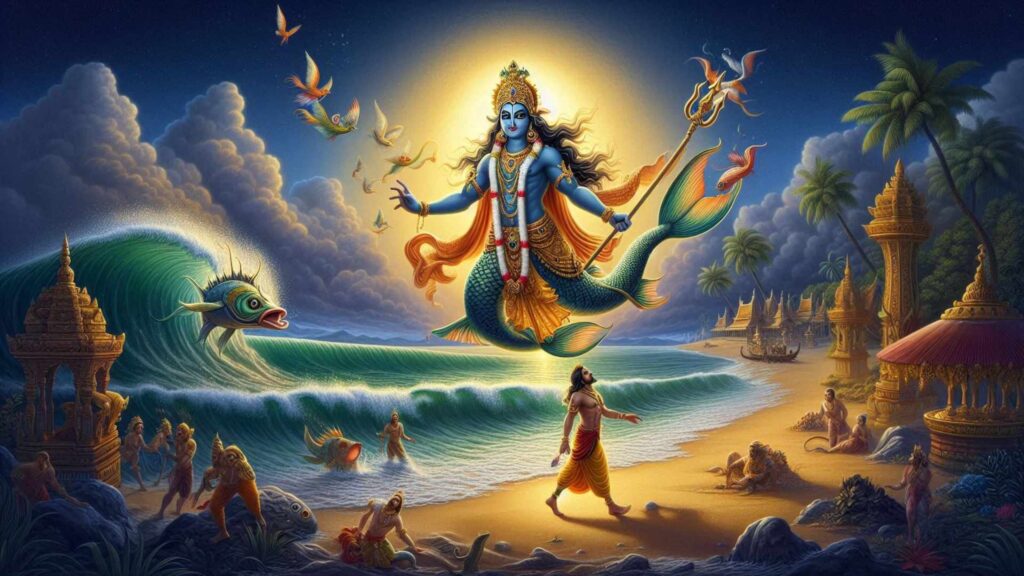
A Visible Form of God
Matsya’s form demonstrates Vishnu’s ability to adapt and protect creation in times of crisis, embodying divine intervention.
Representation of Knowledge and Enlightenment
Matsya’s rescue of the Vedas underscores the importance of preserving wisdom and pursuing enlightenment as a path to liberation.
Connection to Spiritual Awakening
Matsya’s emergence from water, a symbol of subconscious and renewal, represents spiritual awakening and the need to rise above ignorance.
Role in Yoga and Meditation
Matsya inspires focus and adaptability in yogic practices, symbolizing the importance of inner balance and mindfulness.
Worship and Rituals
Benefits of Worship
Worshiping Matsya is believed to:
- Protect against ignorance and adversity.
- Guide individuals toward clarity and righteousness.
- Bestow prosperity and spiritual growth.
Daily Worship Practices
- Chanting the Matsya mantra: “Om Matsyaya Namah”.
- Offering water, flowers, and incense to Vishnu idols.
Best Times for Worship
- Ekadashi: Auspicious for all Vishnu avatars.
- Vaishakha month: Known for water-related rituals and Vishnu worship.
Important Festivals
- Matsya Jayanti: Celebrating Matsya’s divine appearance.
- Vaikuntha Ekadashi: Observing Vishnu’s protective role.
List of Famous Temples
- Matsya Narayana Temple (Pushkar, Rajasthan).
- Srirangam Temple (Tamil Nadu).
- Matsya Temple (Kumbakonam, Tamil Nadu).
Modern Relevance
Scientific Understanding
- Matsya symbolizes adaptability, much like the evolution of species from aquatic to terrestrial life.
- The preservation of Vedas aligns with modern efforts to conserve knowledge and culture.
Environmental Consciousness
Matsya’s association with water emphasizes the importance of conserving aquatic ecosystems and ensuring access to clean water.
Health Benefits and Energy Connection
- Worshiping Matsya inspires emotional balance and stress relief, akin to the calming effect of water.
- Meditation on Matsya promotes mental clarity and resilience.
Sustainable Living Practices
Matsya’s narrative promotes harmony with nature, emphasizing the interconnectedness of all life forms.
Cultural Impact
Influence on Indian Art and Architecture
Matsya is a popular subject in temple carvings, murals, and sculptures, often depicted alongside the deluge story.
Presence in Literature and Poetry
Matsya’s story is celebrated in the Bhagavata Purana and other scriptures, inspiring poets and scholars for centuries.
Impact on Daily Customs
Devotees invoke Matsya during water-related rituals, such as rain prayers and offerings to rivers.
Regional Variations in Worship
- North India: Celebrated during Vishnu festivals.
- South India: Matsya temples feature prominently in local rituals.
Practical Applications
Morning Prayers and Rituals
Starting the day with Matsya’s mantra fosters adaptability and focus, helping individuals navigate challenges.
Dietary Recommendations
Fasting on Ekadashi is associated with Vishnu worship, including Matsya, promoting physical and mental purification.
Astrological Significance
Matsya is associated with Pisces, reflecting adaptability, wisdom, and emotional depth.
Gemstones and Metals
- Aquamarine: Associated with water and clarity.
- Silver: Symbolizing purity and spiritual focus.
Conclusion
Summary
Matsya, the first avatar of Vishnu, embodies the divine principles of preservation, adaptability, and knowledge. His story is a timeless reminder of the importance of protecting wisdom and upholding dharma.
Universal Message
Matsya’s narrative encourages harmony with nature, adaptability in adversity, and the pursuit of spiritual growth as pathways to a fulfilling life.
Call to Action
Embrace Matsya’s teachings and practices to navigate life’s challenges with wisdom, courage, and balance.
